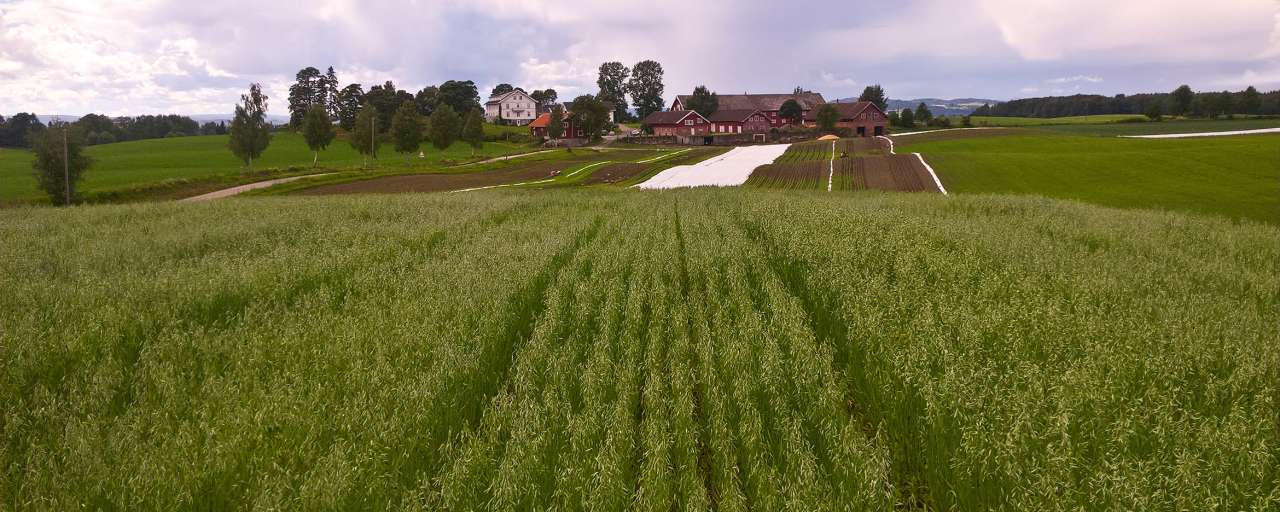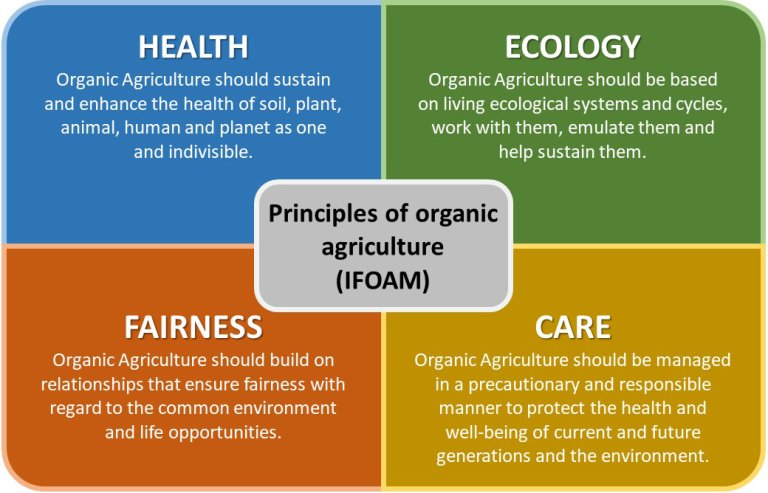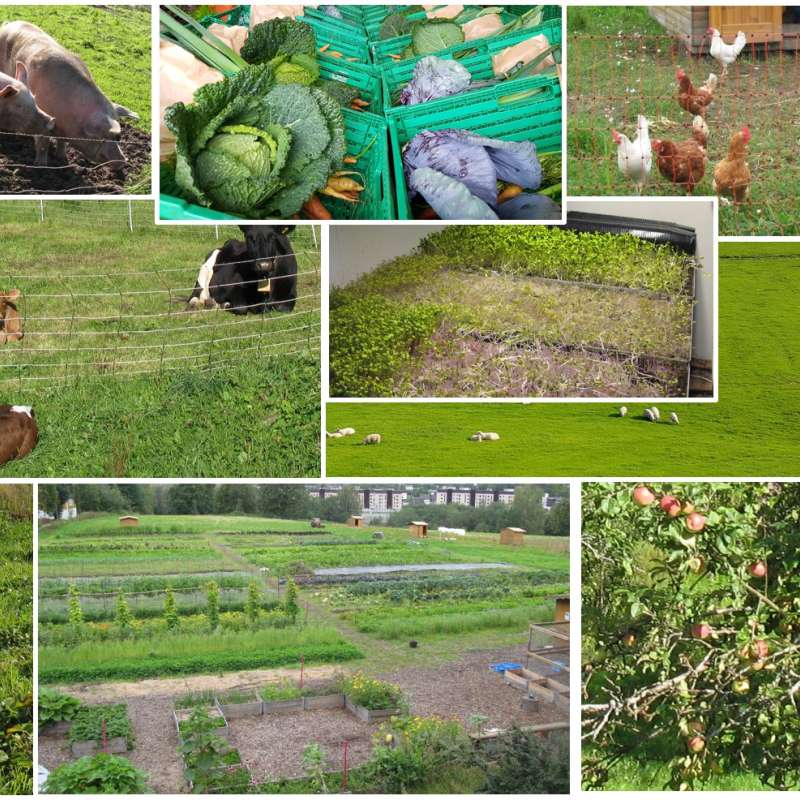
Organic agriculture
NIBIO contributes with research-based knowledge to the development of organic agriculture. NIBIO expands its knowledge in specific disciplines within the field of agronomy, animal nutrition, and economics, and on a more integrated level, by studying production systems and environmental effects.

Organic agriculture is a regulated farming system built on principles and ethical guidelines established by the International Federation of Organic Agriculture Movements (IFOAM).
In Norway, organic agriculture is regulated through the Regulations on organic production and labeling of organic agricultural products and foodstuffs (Økologiforskriften). The Norwegian Food Safety Authority has overarching responsibility for regulations relating to the production, processing, storage, import, and sale of organic agricultural products, and has delegated the responsibility for supervision to Debio.
Organic agricultural production is part of the EEA agreement, which means that the EU's organic production regulations are included in the Norwegian Økologiforskriften, alongside any additional Norwegian provisions.
The need for knowledge
Organic farming methods are developing continuously as our knowledge increases. NIBIO has found that there is a need for more knowledge in order to solve everything from highly specific bottlenecks in individual productions, to how to develop sustainable value chains. For example:
- How can we base livestock production more heavily on the natural local and regional resources?
- How can we maintain a good supply of plant nutrients without using conventional manure?
- How can we ensure good cooperation between producers and sellers?
- How can we produce a stable and sufficient volume of high-quality vegetable foodstuffs?
- How can we ensure good plant health?
This means that there is a need for interdisciplinary projects encompassing agronomy, the environment, energy, economics, and social factors.

Publications
Authors
Pia C. Kristiansen Julie B. Myrås Thea T. Nørvåg Marit I. Kvernmoen Benedicte S. Nilssen Sebastian Eiter Wendy FjellstadAbstract
No abstract has been registered
Authors
Janet G. Atandi Noah Adamtey Agnes W. Kiriga Edward N. Karanja Martha W. Musyoka Felix M. Matheri Chrysantus M. Tanga Danny L. Coyne Komi K. M. Fiaboe David Bautze Solveig HaukelandAbstract
Despite their important ecological roles for soil health and soil fertility, free-living nematodes (FLN) have received relatively limited research attention. The present study evaluated the community structure and diversity of FLN in a field setting. The experiments were conducted in on-farm and on-station field plots sown to maize (Zea mays) and beans (Phaseolus vulgaris) under four cropping practices. These farming systems included organic (compost and biopesticide use), conventional (synthetic fertilizer and pesticide applications), farmer practice (organic and synthetic amendments) and a control (non-amended plots). Nineteen genera of free living nematodes, belonging to bacterivores, fungivores, omnivores and predators were recorded. Among these, bacterivores (Cephalobidae and Rhabditidae) were the most dominant group in the organic systems when compared to the conventional and control systems. Farming systems influenced the abundance and diversity of free living nematodes, with the organic farming system having higher values of maturity, enrichment and structural indices than other farming systems. This would indicate greater stability in soil health and improved soil fertility. This implies that the organic farming systems play a key role in improving the biodiversity and population buildup of FLN, compared with other systems. Our study helps to improve our understanding of how farming systems influence soil biodynamics, while studies on the longer-term effects of organic and conventional farming systems on the build-up or reduction of free living nematodes for improved ecosystem services are needed.
Authors
Lucius Tamm Barbara Thuerig Stoilko Apostolov Hugh Blogg Esmeralda Borgo Paola Elisa Corneo Susanne Fittje Michelangelo de Palma Adam Donko Catherine Experton Évelyne Alcázar Marin Ángela Morell Pérez Ilaria Pertot Anton Rasmussen Håvard Steinshamn Airi Vetemaa Helga Willer Joëlle Herforth-RahméAbstract
No abstract has been registered
Abstract
No abstract has been registered
Authors
Anna Avetisyan M. Hokhanyan Kristina Herdt leidulf Lund Anne Linn Hykkerud Laura Jaakola Inger MartinussenAbstract
No abstract has been registered
Abstract
© 2021 Elsevier Ltd. All rights reserved. This is the postprint version of the article published in Journal of Rural Studies. It will be available 18.08.2023 after an embargo period of 24 months.You can find the published article here: https://doi.org/10.1016/j.jrurstud.2021.08.018
Abstract
For a 100% organic value chain, we need more varieties suitable for organic cultivation. Varieties bred for organic growing is a challenge in small markets. Many breeding goals are equal for organic and conventional cereals. Hence, accessions failing qualification as commercial varieties may perform well in organic growing. A field experiment over two years was performed at two growing sites to compare 25 accessions of spring wheat, ranging from old heritage varieties to modern breeding lines. We assessed yield and agronomic characteristics, artisan bread baking quality and sensory characteristics. Modern accessions gave best yields. Old varieties had smaller kernels, less grain filling, lower falling numbers and SDS-sedimentation volumes, but higher concentrations of minerals, although the growing site has a strong effect. Bread from modern accessions performed best in a baking test. Several sensory characteristics such as juiciness, chew resistance, firmness, acid taste and vinegar odor varied between varieties. Heritage varieties have an important cultural value, and many consumers are willing to pay a significant premium price for such products. A premium price is required, since yield levels are often considerably lower.
Abstract
Self-sufficiency with feed (SSF) is a basic principle in organic animal production. The current regulations do not impose strict requirements for SSF at farm level, but further restrictions are expected in future. The aim of the present work was to quantify SSF on a range of organic dairy farms in Norway and study farmers’ strategies to produce milk with a high degree of SSF. Nine farms were selected for interview and data collection. On farm level, the proportion of SSF varied between 66 and 99 %. SSF increased to 88-100 % when expressed on national level. Land area is among the limiting factors for famers to reach higher SSF while maintaining the milk production level. A lower proportion of concentrates in the diet seems to have as strong impact on SSF as using own cereals and protein crops as feed, but milk production per total feed production area was highest for the latter. The farmers’ goals and actions are important driving forces to develop more SSF in dairy production systems.
Abstract
No abstract has been registered
Authors
Milica Fotiric Akšic J. Mutic Z. Tešic Mekjell MelandAbstract
Apples are an important source of bioactive compounds, especially mineral nutrients. Minerals (both macro- and micro-elements) are responsible for the functioning of the human body, and involved in the metabolism and production of carbohydrates, lipids, proteins, vitamins and enzymes. The objective of this study was to determine and compare the content of some minerals (K, P, Ca, Mg and Fe) of two different apple cultivars (‘Red Aroma Orelind’ and ‘Discovery’), both in peel and pulp, grown in organic and integrated production systems in western Norway in 2015. Samples of fruits were prepared by microwave digestion using an Ethos 1 microwave system. All analyses were performed in triplicate on a Thermo Scientific iCAP 6500 Duo ICP. The results showed that potassium was found in the largest quantity in both apple cultivars and in both management systems and average concentration was 944.3 µg g-1 of fresh weight (FW). Calcium was in second place with average of 180.6 µg g-1 FW. Both apple cultivars had largest amounts of both K and P (in peel and flesh) from organic production compared to fruits coming from the integrated production system. The cultivar ‘Red Aroma Orelind’ had a significantly higher level of Fe in organic fruits compared to integrated. The present study showed that the highest values of K/Ca, (K+Mg)/Ca and Mg/Ca were obtained from the cultivar ‘Discovery’ under organic production (both in peel and flesh). Regarding significantly higher concentrations of P, K, Mg, Fe and balanced mineral ratios in organic apples, it can be concluded that those fruits have higher quality, and are at lower risk of bitter pit when stored.
Abstract
No abstract has been registered
Abstract
Microbes are central drivers of soil processes and in-depth knowledge on how agricultural management practices effects the soil microbiome is essential in the development of sustainable food production systems. Our objective was therefore to explore the long-term effects of organic and conventional cropping systems on soil bacterial and fungal quantity, their community structures and their combined function. To do so, we sampled soil from a long-term experiment in Southeast Norway in 2014, 25 years after the experiment was established, and performed a range of microbial analyses on the samples. The experiment consists of six cropping systems with differences in crop rotations, soil tillage, and with nutrient application regimes covering inorganic fertilizers, cattle slurry (both separately and combined with inorganic fertilizers) and biogas residues from digested household biowaste. The quantity of soil microbes was assessed by extraction of microbial C and N and by analysis of soil DNA (bacterial 16S rRNA, and fungal rRNA internal transcribed spacer region). The structures of the microbial communities were determined and assessment of relatedness of bacterial and fungal communities was done by the unweighted pair group method. Estimates of richness and diversity were based on numbers of unique operational taxonomic units from DNA sequencing and the function of the microbial assembly was measured by means of enzyme assays. Our results showed that production systems including leys had higher microbial biomass and higher numbers of bacterial and fungal gene copies than did systems with cash crops only. A cropping system which appeared to be particularly unfavourable was a reference-system where stubble, roots and exudates were the single source of organic material. Production system significantly affected both bacterial and fungal community structures in the soil. Systems including leys and organic fertilization had higher enzyme activities than did systems with cash crops only. An inclusion of ley in the rotation did not, however, increase either microbial richness or microbial diversity. In fact, the otherwise suboptimal reference-system appeared to have a richness and diversity of both bacteria and fungi at levels similar to those of the other cropping systems, indicating that the microbial function is largely maintained under less favourable agricultural treatments because of the general resilience of soil microorganisms to various stresses. Neither disturbance through tillage nor the use of chemical fertilizer or chemical plant protection measures seemed as such to influence soil microbial communities. Thus, no differences between conventional and organic farming practices as such were found. We conclude that the choice of agricultural management determines the actual microbial community structure, but that biodiversity in general is almost unaffected by cropping system over many years. Adequate addition of organic material is essential to ensure a properly functioning microbial ensemble and, thus, to secure soil structure and fertility over time.
Abstract
No abstract has been registered
Abstract
No abstract has been registered
Authors
Gillian Butler Sokratis Stergiadis Eleni Chatzidimitriou Enrica Franceschin Hannah R. Davis Carlo Leifert Håvard SteinshamnAbstract
No abstract has been registered
Abstract
No abstract has been registered
Abstract
Minimising outputs of waste and pollution by recycling and efficient utilisation of renewable resources is of common interest for organic agriculture and the concepts of circular and bioeconomy. However, in practice, many efforts to increase recycling of various biological materials in organic agriculture are hampered because standards for certified organic production and processing tend to prefer natural products while avoiding processing and especially chemical processes. This creates several dilemmas and weakens the position of organic agriculture as a spear head in the development of a better resource utilisation which will reduce environmental impacts from food production. Based on practical examples derived from projects aimed at better utilisation of residual materials in various food chains, this paper presents some of these dilemmas. Our aim is to initiate a discussion among organic agriculture stakeholders about the regulations for organic production, how they restrict recycling and a better utilisation of valuable resources, and how this can be overcome.
Authors
Jordi Doltra Patricia Gallejones Jørgen E. Olesen Sissel Hansen Randi Berland Frøseth Maike Krauss Jarosław Stalenga Krzysztof Jończyk Adela Martínez-Fernández Gaio Cesare PaciniAbstract
Soil fertility building measures should be explored at the short and long-term for an adequate evaluation of their impact on sustaining yields and of its environmental consequences in crop rotations under organic farming. For such a purpose, process-based crop models are potential useful tools to complement and upscale field observations under a range of soil and climatic conditions. Organic rotations differ in soil fertility dynamics in comparison to conventional farming but very few modelling studies have explicitly considered this specific situation. Here, we evaluate the FASSET model to predict the effects of different fertility management options in organic crop rotations on dry matter (DM) and nitrogen (N) yield, and soil N dynamics, including N2O emissions. For that, we used data from seven short and long-term field experiments in different agro-climatic environments in Europe (Norway, Denmark, Poland, Switzerland, Italy and Spain) including climate, soil and management data. Soil fertility building measures covered fertilization type, green manures, cover crops, tillage, crop rotation composition and management (organic or conventional). Model performance was evaluated by comparing observed and simulated values of crop DM and N yield, soil mineral N and nitrous oxide (N2O) emissions using five complementary statistical indices. The model closely reproduced most observed DM and N yield trends and effects of soil fertility building measures in arable crops, particularly in cereals. Contrary, yields of grass-clover, especially N, were generally reproduced with low degree of accuracy. Model performance for simulating soil mineral N depended on site and the availability of soil and management information. Although high uncertainty was associated to the simulation of soil N dynamics, differences of cumulative N2O emissions between fertility building measures were reflected in model outputs. Aspects for modelling improvement include cover crop growth and decomposition, biological N fixation (BNF) or weed and pest soil-crop interactions. It is concluded that FASSET can be successfully used to investigate the impact of fertilization type, green manures, tillage and management (organic or conventional) on crop productivity and to a certain extent on soil N dynamics including soil N2O emissions at different soils and climates in organic farming in Europe.
Authors
Ievina Sturite Arta Kronberga Vija Strazdina Aina Kokare Mauritz Åssveen Anne Kari Bergjord Olsen Vita Sterna Evita StraumiteAbstract
Multilocation testing remains the main tool for understanding varietal responses to the environment. Here, Latvian and Norwegian hull-less and hulled barley varieties were tested in field experiments in Latvia and Norway in order to assess the varieties adaptability across environments (sites). Two Latvian (cv Irbe and cv Kornelija) and one Norwegian hull-less barley variety (cv Pihl) were tested along with one Latvian (cv Rubiola) and one Norwegian hulled barley variety (cv Tyra) under conventional and organic management systems. The grain yield, together with physical and chemical grain parameters were compared, and variety yield and protein stability detemined. Overall, grain yield of hull-less barley varieties was significantly lower than for hulled barley varieties regardless of climatic conditions and management system. However, in the organic farming systems this difference between barley types was less pronounced. The hull-less barley varieties cv Pihl and cv Irbe, along with both hulled varieties, had good yield stability across environments and were well adapted to both cropping systems. Hull-less barley varieties tended to contain more protein and β -glucans than hulled barley varieties. Despite being bred for local conditions in Norway and Latvia, our study shows that all the varieties used may be successfully transferred across countries.
Abstract
No abstract has been registered
Authors
Matthias KoeslingAbstract
No abstract has been registered
Authors
Bente FøreidAbstract
No abstract has been registered
Abstract
No abstract has been registered
Authors
Dominika Średnicka-Tober Marcin Barański Chris Seal Roy Sanderson Charles Benbrook Håvard Steinshamn Joanna Gromadzka-Ostrowska Ewa Rembiałkowska Krystyna Skwarło-Sońta Mick Eyre Giulio Cozzi Mette Krogh Larsen Teresa Jordon Urs Niggli Tomasz Sakowski Philip C. Calder Graham C. Burdge Smaragda Sotiraki Alexandros Stefanakis Halil Yolcu Sokratis Stergiadis Eleni Chatzidimitriou Gillian Butler Gavin Stewart Carlo LeifertAbstract
Demand for organic meat is partially driven by consumer perceptions that organic foods are more nutritious than non-organic foods. However, there have been no systematic reviews comparing specifically the nutrient content of organic and conventionally produced meat. In this study, we report results of a meta-analysis based on sixty-seven published studies comparing the composition of organic and non-organic meat products. For many nutritionally relevant compounds (e.g. minerals, antioxidants and most individual fatty acids (FA)), the evidence base was too weak for meaningful meta-analyses. However, significant differences in FA profiles were detected when data from all livestock species were pooled. Concentrations of SFA and MUFA were similar or slightly lower, respectively, in organic compared with conventional meat. Larger differences were detected for total PUFA and n-3 PUFA, which were an estimated 23 (95 % CI 11, 35) % and 47 (95 % CI 10, 84) % higher in organic meat, respectively. However, for these and many other composition parameters, for which meta-analyses found significant differences, heterogeneity was high, and this could be explained by differences between animal species/meat types. Evidence from controlled experimental studies indicates that the high grazing/forage-based diets prescribed under organic farming standards may be the main reason for differences in FA profiles. Further studies are required to enable meta-analyses for a wider range of parameters (e.g. antioxidant, vitamin and mineral concentrations) and to improve both precision and consistency of results for FA profiles for all species. Potential impacts of composition differences on human health are discussed.
Authors
Randi Seljåsen Hanne L. Kristensen Ursula Kretzschmar Inès Birlouez-Aragon Flavio Paoletti Charlotte Lauridsen Gabriela S. Wyss Nicolaas Busscher Elena Mengheri Fiorella Sinesio Raffaele Zanoli Daniela Vairo Alexander Beck Johannes KahlAbstract
Quality traits are highly focused upon in the marketing of organic food products. There is a need to define and measure quality as consumers seem to have preconceived notions about the superior health value and taste of organic compared to non-organic products. A commonly held opinion among many consumer groups is that organic farming guarantees optimum quality, despite the fact that this remains unproven. The aim of this paper is to contribute to a better understanding of the complexity of quality traits in a plant-based food product, using carrots as an example. Selected designated quality aspects are presented to describe the complexity of quality and discuss the challenges of using these aspects in differentiating between organic and conventional products. The paper concludes we have insufficient tools to be able to adequately authenticate organically produced carrots. The same may be the case for most vegetables and fruit products. Suggestions for further studies include the soil and location aspect (terroir), in order to trace a product back to its origin in an organically or conventionally farmed field by finding a unique fingerprint for chemical constituents of samples.
Abstract
Embodied energy in barns is found to contribute to about 10–30% of total energy use on dairy farms. Nevertheless, research on sustainability of dairy farming has largely excluded consideration of embodied energy. The main objectives of this study were to apply an established model from the residential and commercial building sector and estimate the amount of embodied energy in the building envelopes on 20 dairy farms in Norway. Construction techniques varied across the buildings and our results showed that the variables which contributed most significantly to levels of embodied energy were the area per cow-place, use of concrete in walls and insulation in concrete walls. Our findings are in contrast to the assumption that buildings are similar and would show no significant differences. We conclude that the methodology is sufficiently flexible to accommodate different building design and use of materials, and allows for an efficient means of estimating embodied energy reducing the work compared to a mass material calculation. Choosing a design that requires less material or materials with a low amount of embodied energy, can significantly reduce the amount of embodied energy in buildings.
Abstract
No abstract has been registered
Abstract
The calculation of the embedded energy (EE) of twenty barns shows that there is a considerable variation of EE per cow, where the lowest values were one fourth of the highest. Use of timber instead of concrete in walls had most effect to reduce the amount of EE. Cold barns can contribute to reduce the amount of EE, while the amount of EE is higher in free-stall than in tie-stall barns.While for an existing building the amount of EE is nearly fixed, calculating the anticipated amount for a new building can contribute to reduce this value considerably. This progress can help to reduce energy use in organic agriculture and thus contribute to a more sustainable production. Incorporating EE in planning new buildings should be of special importance for organic farming, since regulations demand for more area per animal than in conventional farming. In addition to building new, renovation and extension as well as recycling of building materials should be considered. Planning a new building should also include other topics as operational energy, as well as working conditions, animal welfare and economic considerations.
Authors
Matthias Koesling Anne-Kristin Løes Ola Flaten Niels Heine Kristensen Mette Weinreich HansenAbstract
No abstract has been registered
Abstract
No abstract has been registered
Authors
Carola Strassner Melanie Lukas Anne-Kristin LøesAbstract
No abstract has been registered
Authors
Randi Therese Garmo Steinar Waage Ståle Sviland Britt Henriksen Olav Østerås Olav ReksenAbstract
The objectives of this study were to investigate whether there were differences between Norwegian Red cows in conventional and organic farming with respect to reproductive performance, udder health, and antibiotic resistance in udder pathogens. Twenty-five conventional and 24 organic herds from south-east and middle Norway participated in the study. Herds were matched such that geographical location, herd size, and barn types were similar across the cohorts. All organic herds were certified as organic between 1997 and 2003. All herds were members of the Norwegian Dairy Herd Recording System. The herds were visited once during the study. The relationship between the outcomes and explanatory variables were assessed using mixed linear models. Results: There were less > 2nd parity cows in conventional farming. The conventional cows had higher milk yields and received more concentrates than organic cows. Although after adjustment for milk yield and parity, somatic cell count was lower in organic cows than conventional cows. There was a higher proportion of quarters that were dried off at the herd visit in organic herds. No differences in the interval to first AI, interval to last AI or calving interval was revealed between organic and conventional cows. There was no difference between conventional and organic cows in quarter samples positive for mastitis bacteria from the herd visit. Milk yield and parity were associated with the likelihood of at least one quarter positive for mastitis bacteria. There was few S. aureus isolates resistance to penicillin in both management systems. Penicillin resistance against Coagulase negative staphylococci isolated from subclinically infected quarters was 48.5% in conventional herds and 46.5% in organic herds. Conclusion: There were no large differences between reproductive performance and udder health between conventional and organic farming for Norwegian Red cows.
Abstract
No abstract has been registered
Authors
Audun KorsæthAbstract
No abstract has been registered
Abstract
No abstract has been registered
Abstract
The frequency with which ewe lambs lay on wooden surfaces at two levels, called ``double bunks,"" was documented by video recording at 6, 11 and 18 months of age: the number in each of 4 pens (n = 4) lying either on double bunks (DBs) or on the expanded metal floor (EMF) was recorded. At 6 months, lambs were sheared half way through the research period and DBs of two different heights (50/60 cm) and depths (60/75 cm) were tested. At other ages the lambs were sheared before testing and all DBs were the 60 cm 60 cm design. Fully fleeced lambs aged 6 months preferred to lie on EMF rather than DB (P < 0.001). After shearing, the use of EMF for resting declined (P < 0.05) and no significant preference between EMF and DB was found. The lambs tended to lie less when newly sheared (P = 0.06). At 11 months, sheared lambs used DB just as much as EMF, whereas 18 month old sheared ewe lambs tended to choose DB to lie on (P = 0.09). At 6 months, there was a tendency for more lambs to rest at ground level in the DB when headroom was higher at 60 cm (P = 0.1). No other preferences between DB designs were found. The results are discussed according to the regulations for organic sheep farming in Norway. The lambs showed little preference for resting on a DB compared to EMF, so there is insufficient evidence to recommend a two-level, wooden lying area for sheep.
Abstract
Temporal changes in the scores of selected soil fertility indices were studied over six years in three different cases of organic crop rotation located in southern, eastern and central Norway. The cropping history and the initial scores of fertility indices prior to conversion to organic cropping differed between the sites. Crop yields, regarded as an overall, integrating fertility indicator, were in all rotations highly variable with few consistent temporal trends following the first year after conversion. On the site in eastern Norway, where conversion followed several years of all-arable crop rotations, earthworm number and biomass and soil physical properties improved, whereas the system was apparently degrading with regard to P and K trade balances and contents in soil. On the other two sites, the picture was less clear. On the southern site, which had a relatively fertile soil before conversion, the contents of soil organic matter and K decreased during the six-year period, but the scores of other fertility indices showed no trends. On the site in central Norway, there were positive trends for earthworm-related indices such as worm biomass and tubular biopores, and negative trends for soil porosity. The results, especially those from the eastern site, illustrate the general difficulty in drawing conclusions about overall fertility or sustainability when partial indicators show divergent trends. Consequently, the study gave no unambiguous support to the initial working hypothesis that organic farming increases inherent overall soil fertility, but rather showed that the effect varied among indicators and depended on status of the cases at conversion. It is concluded that indicators are probably better used as tools to learn about and improve system components than as absolute measures of sustainability.
Projects

ECOFISH: Organic fish production through sustainable and environmentally friendly fish farming in Northern areas

Monitoring and control of marine pool ecosystem: a step toward organic farming. Part I and II

Division of Survey and Statistics
Farmers and the city: enhancing added value and sustainability through optimized use of urban and peri-urban farm resources (URBANFARMS)
The project aims at elaborating effective strategies for professional farmers in cities and peri-urban areas to make use of the vicinity of the city to increase added value from their production in an economically, socially and environmentally sustainable way. The project shall identify land resources that are not in optimal use, and demonstrate business models that increase the use of local nutrients and of the nearby city's market and purchasing power.
